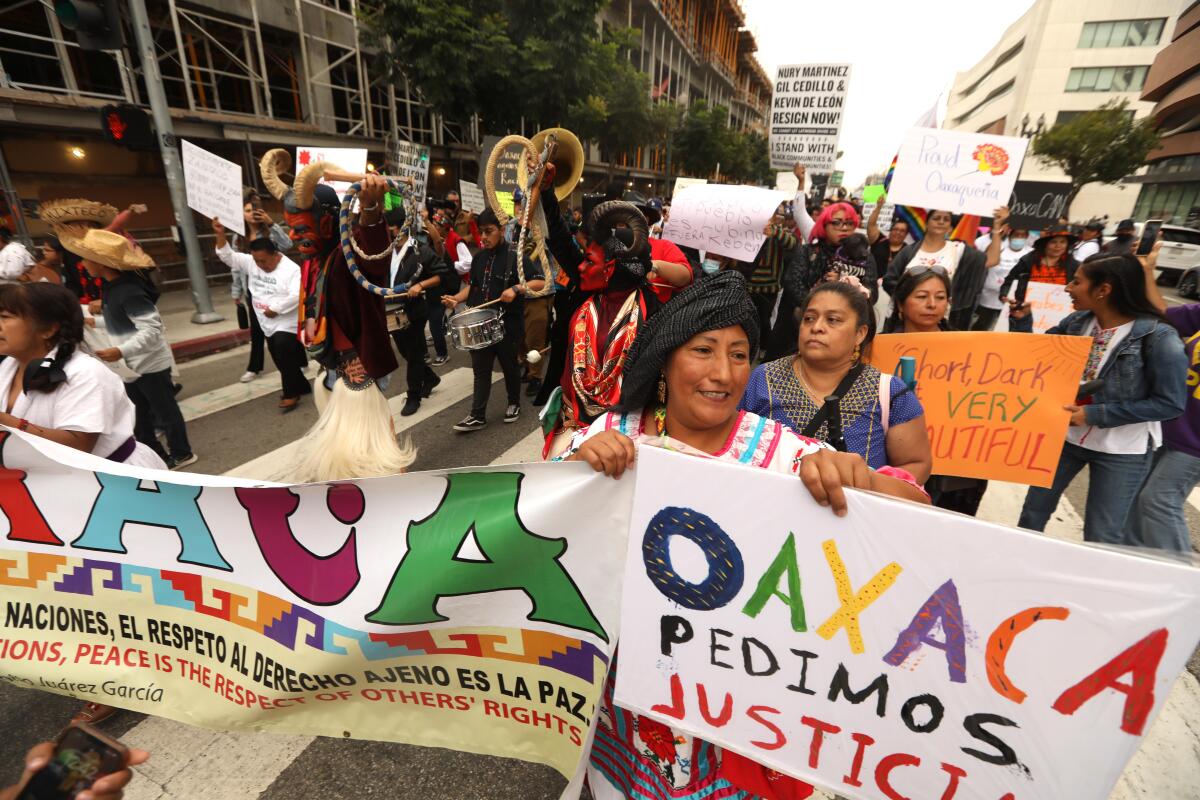Here’s one way to support L.A.’s Indigenous communities

- Share via
Los Angeles has recently welcomed a slate of elected officials following the widespread outrage from the leaked audio recording that has exposed deep-seated, racist behavior within L.A.’s local government.
While Mayor Karen Bass is entering office with strong political support from voters, incoming City Council members will have to reckon with deeply unpopular views of the scandal-plagued council and work to regain the trust of their constituents.
As these newly elected leaders begin addressing the city’s problems with homelessness and housing, it is imperative they make good on commitments to forge a new direction in L.A. politics — one that is based on coalition building and unity — including rebuilding trust with L.A.’s Indigenous communities. One simple and effective starting point is to expand language services within government agencies by properly funding Executive Directive 32.
As an Indigenous woman (Bene Xogsho, Zapotec) born and raised in L.A., I have seen firsthand the impact of language barriers on the city’s Indigenous communities. The tendency to lump Indigenous communities under the broad umbrella of “Hispanic/Latino” not only erases the diversity and cultural richness of the many Indigenous groups that call Los Angeles home, but it also significantly limits the resources dedicated to language access for these groups by assuming that we are all able to speak or understand Spanish. We have seen time and time again that this is not the case: The tragic 2010 police shooting of Manuel Jaminez Xum, a Guatemalan day laborer and native K’iche’ speaker who was unable to understand English and Spanish commands from the police, is a pivotal example of the need for expanded Indigenous language access.
Executive Directive 32, also known as “Strengthening Language Access in the City of Los Angeles” and introduced by Mayor Eric Garcetti in December 2021, will improve access to information and services for over half a million Angelenos who have limited proficiency in English by requiring every city department to implement a plan to handle language access issues — for instance, constituents’ requests for services in different languages and how information is disseminated to reach non-English speaking communities.
L.A. has the largest population of Indigenous people in the United States, and it is home to an estimated 170,000 Indigenous migrants from the Mexican states of Oaxaca, Guerrero, and Michoacán. This translates to more than 17 Indigenous languages spoken in Los Angeles County alone, making it imperative for Indigenous migrants to receive services in their language.
Indigenous organizations like Comunidades Indígenas en Liderazgo (CIELO) have been the primary source behind most of L.A.’s existing Indigenous language resources, such as interpretation services, language and cultural awareness trainings for the Los Angeles Police Department to better identify and assist Indigenous language speakers, and video translations of vital information on COVID-19 into several Indigenous languages.
At a city and state level, however, there is still a troubling lack of official resources for Indigenous language access: Of the 18 languages that the Los Angeles County registrar is required to provide translations and assistance to for voting, there is not a single Indigenous language represented.
The current lack of language accessibility leaves Indigenous Angelenos unable to access the political resources and information necessary to advocate for their communities’ needs. It also leaves many Indigenous workers vulnerable to abuse and exploitation, such as wage theft, with few options for redress. In some cases, language access can even be a matter of life and death: At the start of the COVID-19 pandemic, for instance, many of California’s Indigenous communities missed vital information about how to protect themselves from the pandemic due to language barriers, as most of the news outlets reported only in English or Spanish.
While E.D. 32 is a positive first step toward greater language accessibility, it is currently not included in the Los Angeles budget of 2022-2023. In comparison, New York City has invested $4 million into a similar program to help non-native English speaking students and their families more equitably access information and services. That program now helps over 400,000 students each year by expanding translation services within school facilities, providing workshops and language support to multilingual families, and developing citywide “know your rights” campaigns. It is a model that the L.A. City Council can study to find potential funding sources.
At a time when distrust of the City Council is running high, we need Bass and other incoming elected officials to show that they are willing to commit the dollars and time to develop the programs that truly allow for all communities in Los Angeles to be recognized and supported.
Janet Martinez is co-founder and vice executive director of Comunidades Indígenas en Liderazgo (CIELO).
More to Read
A cure for the common opinion
Get thought-provoking perspectives with our weekly newsletter.
You may occasionally receive promotional content from the Los Angeles Times.









